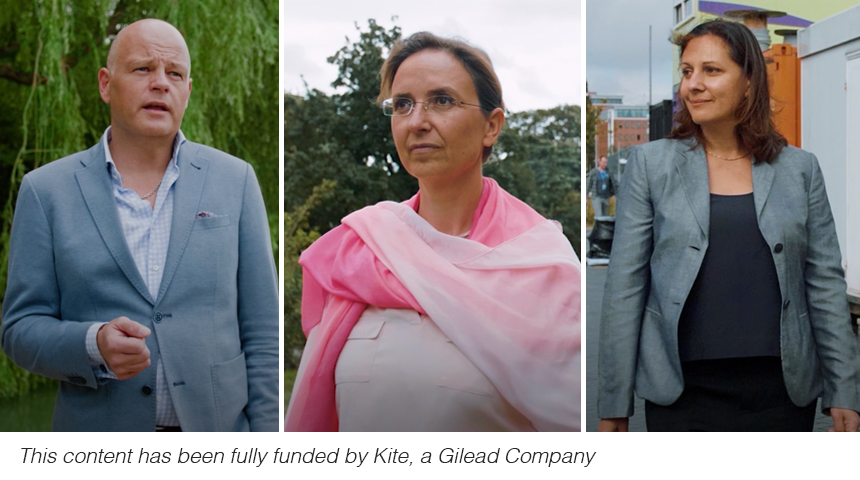Leading from the front in cell therapy

In these videos, senior stakeholders from Kite, a Gilead Company, describe how a culture of innovation and partnership help it lead from the front in the ‘team sport’ of cell therapy.
Dick Sundh, Anne Kerber, and Bethany Dudek reflect on the leadership focus of the company and outline how Kite aims to become the cell therapy leader of Europe.
Embodying leadership in cell therapy
“On my very first day at Kite one of my colleagues said to me ‘Dick, there’s only one thing you need to remember; cell therapy is a team sport,’” says Dick Sundh, Head of Europe for Kite, a Gilead Company, as he describes the process of building the organisation’s cell therapy business in Europe.
Kite has been at the forefront of cell therapy development and, since the first European approvals of CAR T cell therapies in 2018, the company has been establishing the necessary European infrastructures to deliver cell therapies in the region, and manufacture at scale.
According to pharma veteran Sundh, the job has proven to be an interesting challenge and Kite has broken new ground in establishing the foundations required to enable access to cell therapies. “We are learning every day along with our partners and medical institutions across Europe.”
And it’s not only about the science, but about embodying leadership qualities by demonstrating the company’s core values on a daily basis. “When healthcare professionals and employees feel you truly care about patients you have a real opportunity to become a true leader.”
Sundh explains that Kite’s situation is unique; operating as a separate business unit within one of the world’s largest pharma companies, Gilead Sciences.
“It’s about expanding the footprint for cell therapy in Europe. We have the best of both worlds because we have a big pharma company in the background with resources where we need it. Otherwise we’re independent and allowed to go as fast and as innovatively as we want to. Teamwork is at the heart of everything we do.
“I feel very passionate and privileged about being part of redefining not only how we understand oncology, but how we treat it.”
Delivering the potential of cell therapies
Anne Kerber, Vice President, Head of Clinical Development in Europe at Kite, a Gilead Company, describes the clinical process the company is undertaking to deliver on the potential of individualised cell therapies for patients with rare forms of blood cancer, who face ongoing unmet needs.
In her role, Kerber draws on her experience as a qualified haematologist/oncologist to inform her work with a diverse range of research partners across Europe, in the clinical development of cell therapies. “We work closely with many healthcare professionals and see a high level of commitment from physicians to enrol in clinical trials; we understand that, for them, partnership, education and learning is key.”
Having followed the development journey of cell therapies for several years, Kerber has gone on to work with healthcare professionals to build their knowledge of cell therapies for use in their own clinical research.
Kerber stresses the importance of teamwork in developing cell therapies, particularly in light of their complex manufacturing processes when compared to more conventional treatments.
Becoming closely involved with the experiences of patients on their treatment journey is another important part of Kerber’s remit – these are specialist therapies and as such the company has a much closer relationship with their stakeholders than would be the case with a conventional medicine.
“In cell therapy, collaboration is very important and each person in the chain has a critical role to play in ensuring patients receive these therapies at the right time.”
Translating innovation in quality systems into clinical delivery
Bethany Dudek, Executive Director, Head of Quality at Kite, a Gilead Company, describes the complex quality control processes that are required to deliver cell therapies to the exacting standards required.
Dudek and her team oversees everything from inspection of incoming apheresis – white blood cells collected from patients using a specialised process to obtain vital T-cells – to testing and releasing the final product once it has been manufactured.
Cell therapies are bespoke treatments derived from a person’s own T-cells, genetically modified to recognise tumour cells, then returned to the individual patient to trigger their immune system to target certain cancers.
“Once we receive the apheresis, it’s a continuous process until we get to the final product and it’s important that the quality organisation and manufacturing supply chain work closely as a team to get the product back to the hospital and to the patient.”
The remit of the quality team also includes overseeing how the cell therapy product is delivered to patients, which requires the qualification of treating hospitals to undertake this process. This particular step is unique to cell therapies and ensures that treating hospitals understand how to receive and store the product at each stage, as well as maintaining the vital chain of custody throughout.
“It’s exciting because it allows us to collaborate more closely with our European colleagues at Gilead and Kite as well as healthcare professionals in the clinic. It helps us get the treatment to the patient, ensuring optimal quality.”
According to Dudek, the leadership of Kite’s parent company Gilead has been central to allowing these highly specialised cancer therapies to reach patients in Europe.
“The support from Gilead has been very important for our support to healthcare providers and to the centres that provide our product to patients.”
“We learn alongside colleagues, healthcare professionals and other stakeholders how to bring these innovative therapies to the people who need them.”
 |
These videos were sponsored by Kite, a Gilead Company ONC/IHQ/19-06//1290d | October 2019 |











